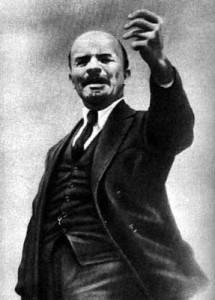Karl Marx writes in the sixth paragraph of the Preface to A Contribution to the Critique of Political Economy (1859):
“In the social production of their existence, men inevitably enter into definite relations, which are independent of their will, namely relations of production appropriate to a given stage in the development of their material forces of production. The totality of these relations of production constitutes the economic structure of society, the real foundation, on which arises a legal and political superstructure and to which correspond definite forms of social consciousness. The mode of production of material life conditions the general process of social, political and intellectual life. It is not the consciousness of men that determines their existence, but their social existence that determines their consciousness. At a certain stage of development, the material productive forces of society come into conflict with the existing relations of production or – this merely expresses the same thing in legal terms – with the property relations within the framework of which they have operated hitherto. From forms of development of the productive forces these relations turn into their fetters. Then begins an era of social revolution. The changes in the economic foundation lead sooner or later to the transformation of the whole immense superstructure.â€
Marx teaches us that “The mode of production of material life conditions the general process of social, political and intellectual life.”
In a previous post on this website “Frederick Engels on Bukunin’s School of Anarchy”, A. Shaw notes that Engels made the case that Anarchists view the state as the ultimate evil and routinely abstain from the political struggle in any meaningful way. In short, Anarchists have a phobia of political struggle. They are extremely successful in persuading people on the left, people of conscience and progressives generally from participating fully in the political struggle in the United States. This is easily confirmed by the pathetic numbers of people who vote.
According to Time magazine, the 2014 midterm elections voter turnout reached a 72 year low and only 36.4% of eligible voters actually voted. Researchers Martin Gilens and Benjamin I. Page maintained that the US political system has transformed from a democracy into an oligarchy where wealthy elites control most political power. The researchers maintain
“The central point that emerges from our research is that economic elites and organized groups representing business interests have substantial independent impacts on U.S. government policy,” they write, “while mass-based interest groups and average citizens have little or no independent influence.”
If this is true, then it is obvious that those people who control the means of production in the United States control the political process as well. The people who control the means of production in the United States, obviously, are the capitalist class, commonly referred to as the 1%.
Marx taught us and examination of the current mode of production easily reveals that market economies are anarchistic in form and content. In other words, market economies are ideologically anarchistic.
Dictionary definitions of anarchism include components such as “rejection of authority” and “absence of government and absolute freedom of the individual, regarded as a political ideal.” Synonyms of anarchy include “lawlessness, nihilism, disorder, chaos, mayhem, tumult, turmoil.†It should be pointed out that nihilism, particularly that form of nihilism expressed by Friedrich Nietzsche, was the dominant ideology of Nazi Germany.
Few would argue that there is no worship of the “absolute freedom of the individual” in the US today.
Few would argue that the distribution of wealth in the USA is not uneven and that the market economy of the US is not chaotic.
An examination of current social relations in the USA reveals absolute anarchy in social, intellectual and political life. Mainstream media conceals the reality of the conduct of the US government every day. Low voter turnout hands elections over to the 1% without a fight. Movies, video games and the Internet have produced a culture based on violence and chaos never before seen in the history of mankind.
Lawlessness, including police terrorism, is rampant across the nation.
The US military violates international law and terrorizes working people around the globe.
Economic warfare waged by the US ruling class creates chaos, anarchy, terror and psychological dysfunction domestically and internationally.
Bizarre behavior among humans in the USA has become the new norm. All of this is a reflection of the chaos and anarchy of the mode of production, i.e. the market economy.
In his “Letters on Tactics”, Lenin defined revolution as the passing of state power from one class to another.
People on the left in the United States give a lot of lip service to “revolution.” However, all too often people on the left equate revolution with anarchy. They don’t seem to have a clue about how to acquire state power. Of course, by playing into the hands of the anarchists, people on the left play into the hands of the capitalists.
Anarchists, because of their phobia of political struggle, routinely abstain from meaningful political activity. Abstention from political activity is abstention from the struggle to acquire state power. Abstention from political activity is therefore abstention from revolution. Abstention from revolution means a free ride for the 1%. Anarchy is therefore antithetical to revolutionary struggle.
People in the US have a choice in front of them. They can continue to worship individualism and anarchy and abdicate their political power to the 1% or they can unite, organize and fight for the interests of working people which include accessible education, healthcare, housing, legal justice and freedom from oppression, exploitation and racism in all its forms. So, working people must choose between anarchy or revolution.












